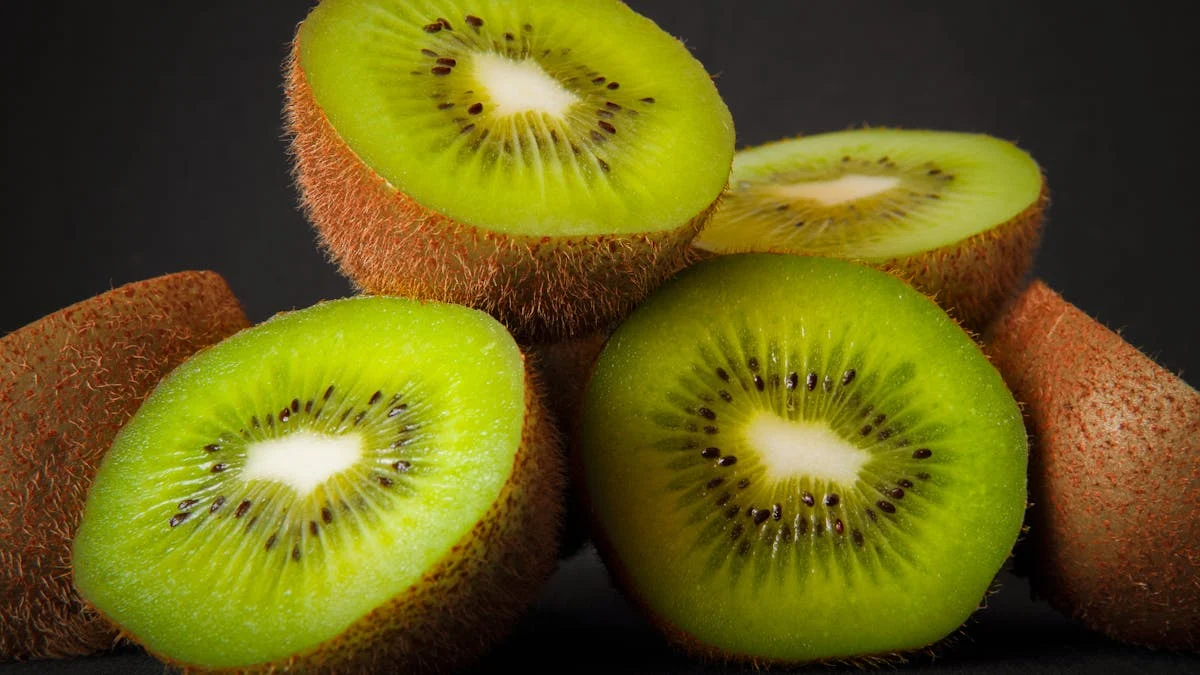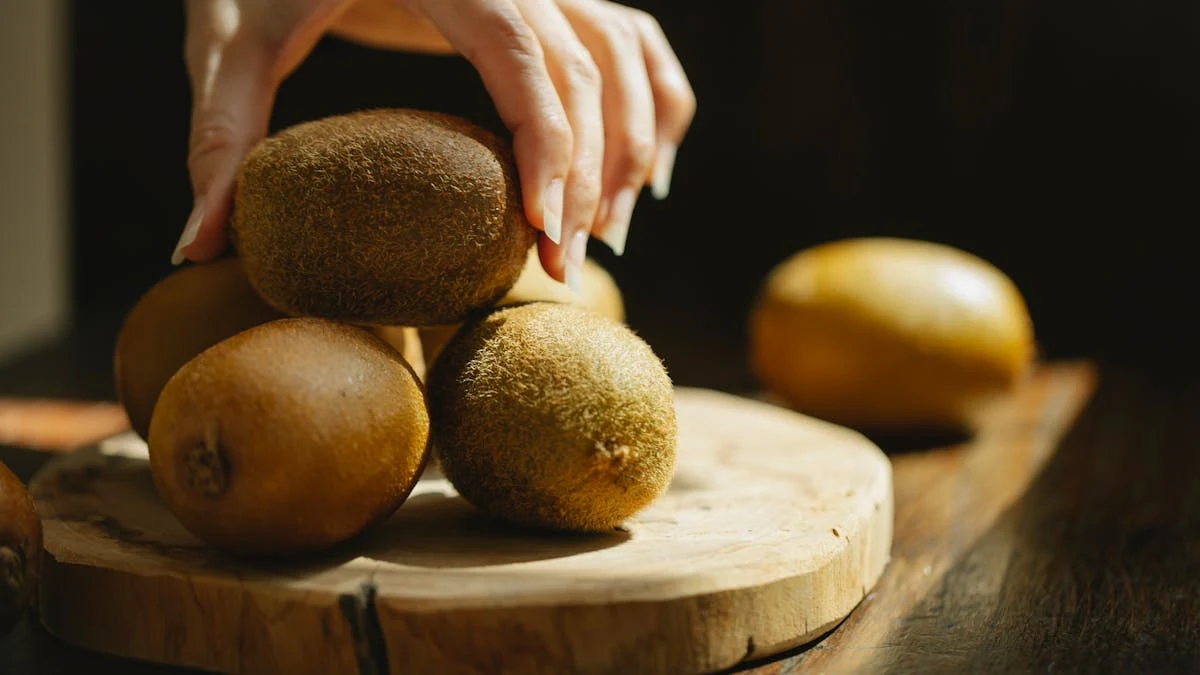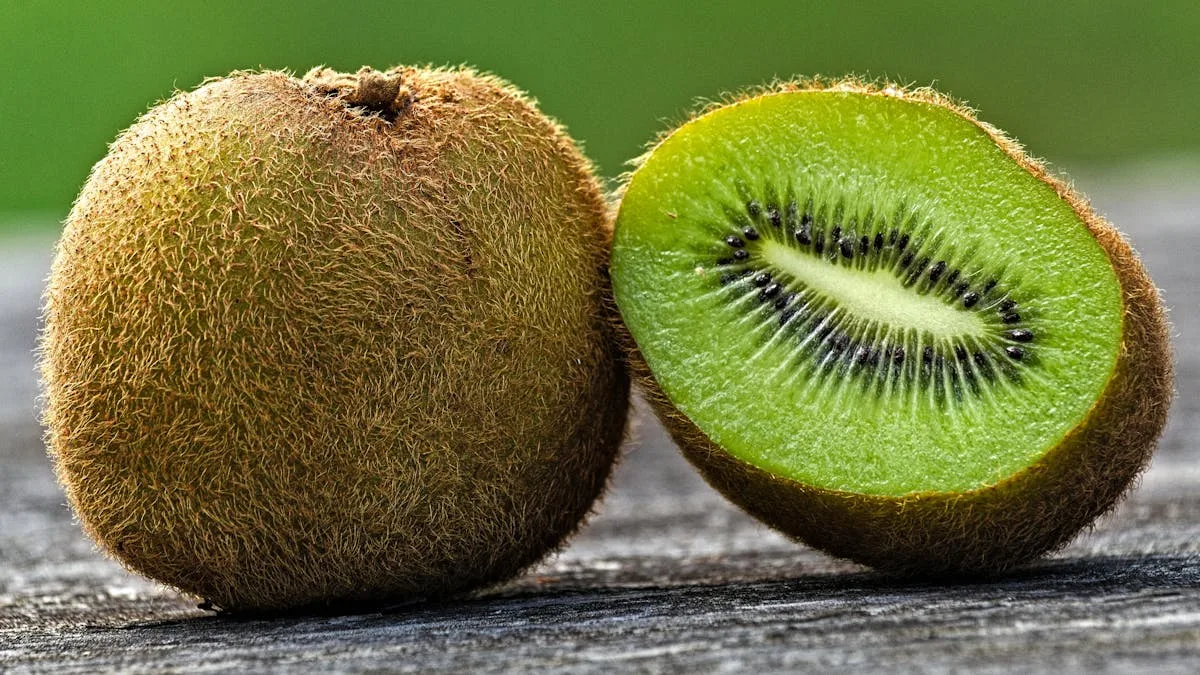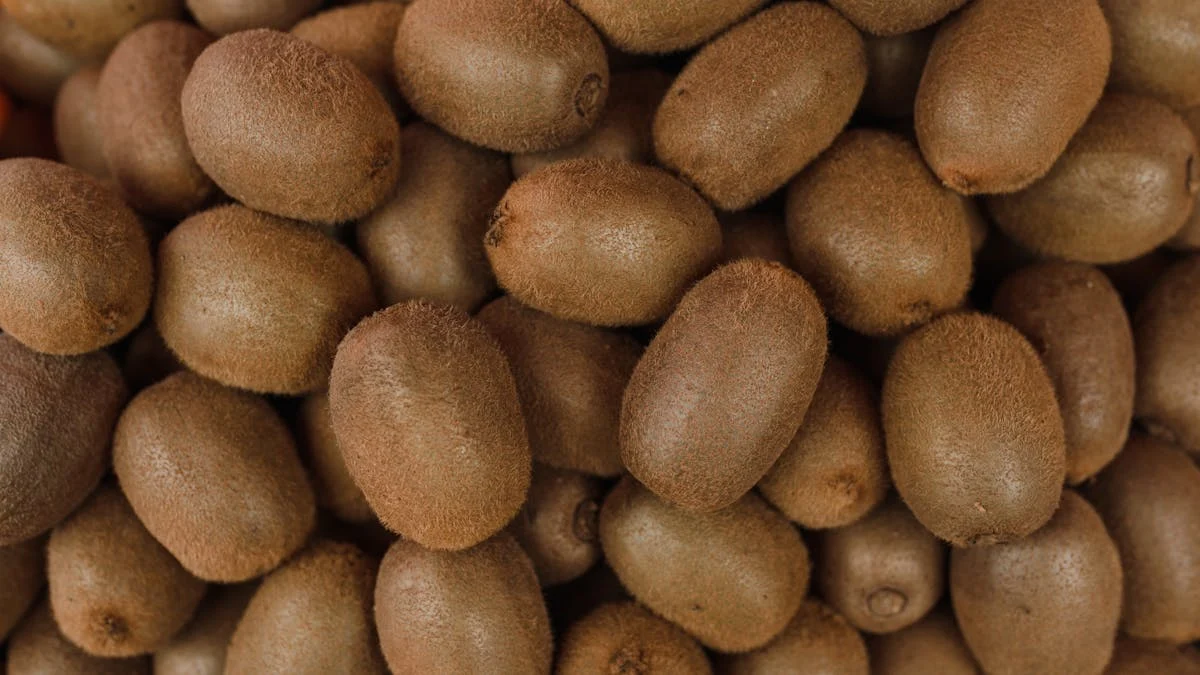Originating from the Yangtze River valley of northern China, this once-exotic fruit has journeyed across the world. Known originally as Chinese gooseberry, it was rebranded as 'kiwi' in the mid-20th century, a nod to New Zealand's national bird.
Now, kiwis enjoy global popularity, finding a special place in grocery stores and kitchens everywhere.
Incorporating fruits like kiwi into our diets is a boon for our health. They are packed with essential nutrients and antioxidants, playing a vital role in a balanced diet. From supporting immune function to enhancing digestive health, the humble kiwi offers an array of health benefits.
In this article, we'll explore the rich array of vitamins and minerals in kiwis and uncover the multitude of health benefits they bring.
Kiwi in a Quick Glance
Nutrients
- Vitamin C: A powerful antioxidant essential for immune function, skin health, and iron absorption.
- Vitamin K: Important for blood clotting and bone health.
- Vitamin E: Another antioxidant, beneficial for skin health and immune function.
- Folate (Vitamin B9): Vital for cell division and the formation of DNA.
- Potassium: Helps regulate blood pressure and is important for heart health.
- Fiber: Aids in digestion and can help with managing blood sugar levels and cholesterol.
- Copper: Plays a role in energy production and supports a healthy immune system.
- Magnesium: Involved in over 300 enzymatic reactions in the body, including energy production and muscle and nerve function.
- Phosphorus: Essential for healthy bones and teeth, and involved in various biochemical processes.
- Calcium: Important for bone health and plays a role in muscle function and nerve signaling.
Health Benefits
- Boosts Immune System: High in vitamin C, which is crucial for immune health.
- Improves Digestive Health: Rich in fiber and a unique enzyme called actinidin that aids digestion.
- Supports Heart Health: Contains potassium and other heart-friendly nutrients, which can help manage blood pressure.
- Promotes Healthy Skin: The vitamins and antioxidants in kiwis contribute to skin health and can protect against UV damage.
- Enhances Sleep Quality: Kiwis contain serotonin and antioxidants that may improve sleep.
- Aids in Weight Management: Low in calories and high in fiber, kiwis can help feel fuller for longer.
- Good for Eye Health: Nutrients in kiwis, like lutein and zeaxanthin, are beneficial for eye health.
- Helps in Managing Blood Sugar Levels: The low glycemic index of kiwis makes them a safe choice for people with diabetes.
- Strengthens Bones: Kiwis have a good amount of vitamin K, which is important for bone health.
- Reduces Inflammation: The anti-inflammatory properties of kiwis can help in reducing inflammation in the body.
- Supports a Healthy Pregnancy: The folate in kiwis is important for the development of the fetus in pregnancy.
Table of Contents
- A Glimpse into the Kiwi World
- Nutritional Profile of Kiwis
- Health Benefits of Kiwis
- Incorporating Kiwis into Your Diet
- Potential Allergies and Considerations
- Frequently Asked Questions About Kiwi
A Glimpse into the Kiwi World
Their unique appearance, with a fuzzy brown skin that encases a vibrant green or golden interior speckled with tiny black seeds, is instantly recognizable. The typical kiwi taste is a delightful balance of sweet and tart, with a soft, juicy texture that makes it a favorite in fruit salads, smoothies, and as a tangy snack on its own.
Tracing the Roots: History and Origin
Native to the Yangtze River valley in northern China, the kiwi was originally known as the 'Chinese gooseberry.' It wasn't until the mid-20th century, when New Zealand fruit growers began cultivating the fruit and exporting it to the United States, that it was renamed 'kiwi' – a homage to New Zealand's iconic, flightless bird.
This rebranding was a marketing triumph, making the fruit more appealing and memorable to Western consumers. New Zealand played a pivotal role in transforming the kiwi from a local delicacy to a fruit enjoyed worldwide.
A Palette of Varieties
Kiwis come in a few distinct varieties, each with its own unique set of characteristics:
- Hayward Kiwi: This is the classic green kiwi. It has a tangy-sweet flavor and is known for its larger size and longer shelf life. The Hayward variety is the most common type found in supermarkets around the world.
- Gold Kiwi: Sporting a smooth, bronze skin, the gold kiwi is a sweeter and less acidic cousin to the green variety. Its golden flesh is less fibrous and has a tropical, almost mango-like flavor.
- Baby Kiwi/ Kiwi Berries: These are miniature versions of the traditional kiwi and can be eaten whole, skin and all. They are sweeter and more grape-like in size and taste, making them a fun, bite-sized snack.
- Red Kiwi: A newer addition to the kiwi family, the red kiwi has a striking red interior. It's sweet with a hint of berry flavor and offers a visual and taste difference that's quite exciting for kiwi enthusiasts.
Each variety of kiwi not only adds a different flavor profile to dishes but also offers its own unique blend of nutrients and benefits, making them a versatile and healthy choice for any diet.
🥝 Tip: To ripen kiwis quickly, place them in a paper bag with an apple or banana - the natural ethylene gas speeds up ripening!
Nutritional Profile of Kiwis
Vitamins
Kiwis are exceptionally rich in vitamin C, with a single fruit providing well over 100% of your daily requirement. This powerful antioxidant is essential for immune system function, skin health, and even iron absorption.
They are also a good source of vitamin K, essential for blood clotting, and vitamin E, another antioxidant important for heart health.
Minerals
Kiwis are rich in minerals such as potassium, which helps manage blood pressure levels, and folate, which is vital for cell division and DNA synthesis. They also contain trace amounts of other minerals like magnesium, copper, and phosphorus.
Fiber for Digestive Health
High in dietary fiber, kiwis aid in digestion and can help prevent constipation. The fiber content also contributes to a feeling of fullness, which can help with weight management.
Antioxidants
Beyond vitamins, kiwis are loaded with antioxidants like carotenoids and flavonoids, which help fight free radicals in the body, reducing oxidative stress and potentially lowering the risk of chronic diseases.
Calories and Macronutrients
Kiwis are low in calories, making them an excellent choice for anyone monitoring their caloric intake. A typical kiwi contains about 42 calories, with most of these calories coming from carbohydrates. They have a low glycemic index, which means they provide a steady source of energy without spiking blood sugar levels.
🍹 Tip: Add a squeeze of lemon or lime to kiwi dishes; the citrus enhances kiwi's vibrant flavor and adds an extra vitamin C boost.
Health Benefits of Kiwis
Let's delve into the ways this small, fuzzy fruit can contribute to our overall well-being.
Improved Digestive Health
Kiwis are fantastic for your digestive system. They're rich in dietary fiber, which is essential for maintaining a healthy digestive tract. Fiber helps to regulate bowel movements, preventing constipation and other digestive issues.
Kiwis contain a unique enzyme called actinidin, which aids in the breakdown of proteins, making digestion smoother and more efficient. (1)
Boosting the Immune System
Packing more vitamin C than an equivalent amount of orange, kiwis are superb for bolstering the immune system. Vitamin C is a potent antioxidant that helps protect the body against free radicals, reduces inflammation, and boosts immune function. (2)
Regular consumption of vitamin C-rich foods like kiwi can help reduce the duration and severity of colds and other infections.
Heart Health
Kiwis are a heart-friendly fruit. They're rich in potassium, a mineral that plays a crucial role in maintaining heart health. Potassium helps to regulate blood pressure by counteracting the effects of sodium and reducing the risk of stroke and heart disease. (3)
The fiber in kiwis also contributes to heart health by lowering cholesterol levels. (4)
Better Sleep
Incorporating kiwis into your diet might also help you sleep better. Studies have shown that eating kiwis before bedtime can improve sleep quality and duration. This is likely due to the presence of serotonin and antioxidants in the fruit, which are known to have sleep-inducing and mood-regulating properties. (5, 6)
Skin and Eye Health
The vitamin E and antioxidants present in kiwis do wonders for skin and eye health. Vitamin E is known for its skin-protective properties, helping to combat UV damage and keeping the skin looking youthful. (7)
The antioxidants, including vitamin C and other phytochemicals, contribute to healthy skin and may reduce the risk of age-related eye diseases. (8, 9)
Weight Management
For those watching their weight, kiwis are an excellent dietary addition. Low in calories but high in fiber, they help you feel full for longer, reducing the likelihood of overeating. The sweetness of kiwi also makes it a great low-calorie option to satisfy sugar cravings in a healthy way.
While no single food is a magic bullet for health, incorporating nutrient-rich fruits like kiwis into your diet can contribute to overall wellness.
Related: The Power of Fruits: Why They're Essential for Optimal Health
🥤 Tip: Blend kiwis with spinach or kale for a nutrient-packed green smoothie that's both healthy and delicious.
Incorporating Kiwis into Your Diet
Choosing and Storing Your Kiwis
To fully enjoy the taste and benefits of kiwis, it’s important to know how to select and store them properly. Here's a quick guide:
- Selecting Kiwis: When buying kiwis, look for fruits that are firm but yield slightly to gentle pressure. Avoid those with bruises or damp spots. If you're in a hurry to eat them, choose slightly softer kiwis; for longer storage, go for firmer ones.
- Storing Kiwis: Unripe kiwis can be left at room temperature to ripen. Once they reach the desired softness, refrigerate them to prolong freshness. Ripe kiwis can be stored in the refrigerator for up to two weeks.
Creative Kiwi Culinary Ideas
Kiwis are incredibly versatile and can add a unique flavor and nutrition boost to various dishes. Here are some ideas to get you started:
- Kiwi Smoothies: Blend kiwis with other fruits like banana, strawberries, or mango for a nutritious smoothie. Add a bit of yogurt or almond milk for creaminess.
- Kiwi Yogurt Parfaits: Layer sliced kiwis with yogurt and granola for a delightful breakfast or snack.
- Kiwi Salsa: Mix chopped kiwi with onion, jalapeño, cilantro, and lime juice for a tangy salsa. It pairs wonderfully with grilled chicken or fish.
- Kiwi Salad: Add sliced kiwi to your greens for a sweet and tangy twist. Kiwis go well with spinach, arugula, and mixed greens.
- Kiwi Popsicles: Puree kiwi and pour it into popsicle molds for a refreshing treat on a hot day.
- Kiwi Tarts or Pavlovas: Use kiwi slices as a topping for desserts like tarts or pavlovas for a fresh, zesty finish.
🍽️ Tip: For an easy, elegant dessert, drizzle honey over sliced kiwis and top with a sprinkle of chopped nuts or coconut flakes.
Introducing Kiwis to Kids and Picky Eaters
Kiwis can be a fun and nutritious addition to any child’s diet. Here are some tips to make kiwis more appealing:
- Make Fun Shapes: Use cookie cutters to cut kiwi slices into fun shapes.
- Kiwi Kebabs: Thread kiwi pieces onto skewers with other fruits for a colorful and healthy snack.
- Involve Them in Preparation: Let kids help peel and slice the kiwi (with supervision) to get them more interested in eating it.
- Kiwi as a Topping: Add kiwi slices to pancakes, waffles, or cereal to make meals more visually appealing and nutritious.
- Smoothie Bowls: Blend kiwis into smoothie bowls and let kids top them with their favorite toppings like nuts, seeds, and more fruit.
- Education: Teach them about the benefits of kiwis in a fun way, like how they're packed with more vitamin C than an orange and can help them stay strong and healthy.
Experimenting with different recipes and presentations can make this fruit a delightful addition to your daily meals.
🧒 Tip: Get kids involved by letting them help make kiwi popsicles – healthy, fun, and perfect for a summer treat.
Potential Allergies and Considerations
Kiwi Allergies and Sensitivities
While kiwis are a nutritious and delicious fruit for many, it's important to be aware that they can cause allergic reactions in some individuals. Understanding these sensitivities is key to enjoying kiwis safely.
Recognizing Kiwi Allergies
Kiwi allergies can range from mild oral irritation to more severe reactions. Symptoms may include itching or tingling in the mouth, swelling of the lips, tongue, or throat, skin rashes, and in rare cases, anaphylaxis.
If you experience any of these symptoms after eating kiwi, it's essential to consult with a healthcare provider.
Cross-Reactivity Concerns
Some individuals with allergies to latex, birch pollen, or other fruits like avocados and bananas may also have a sensitivity to kiwis due to cross-reactivity. This occurs when the proteins in kiwi resemble those in other allergens, triggering a similar immune response.
Kiwis and Medical Conditions
Kiwis are generally safe for most people, but there are a few considerations for those with certain medical conditions:
Kidney Stones
Kiwis contain oxalates, which, in high concentrations, can contribute to the formation of kidney stones in susceptible individuals. If you have a history of oxalate-related kidney stones, it’s advisable to moderate your intake of kiwi and consult with your healthcare provider.
Blood Thinning Medication
Kiwis are high in vitamin K, which plays a significant role in blood clotting. If you're on blood-thinning medications like warfarin, it's important to maintain a consistent intake of vitamin K-rich foods like kiwi to prevent interactions with your medication. Always consult your doctor for personalized advice.
Gastrointestinal Sensitivity
While the fiber in kiwis is great for digestive health, it can cause discomfort for people with certain gastrointestinal conditions like irritable bowel syndrome (IBS). If you have a sensitive digestive system, start with a small amount to see how your body reacts.
If you have concerns about allergies or how kiwis may interact with your health conditions, it's wise to consult with a healthcare professional for personalized advice.
💡 Tip: Freeze kiwi slices and use them as natural ice cubes in water or iced tea for a refreshing twist.
Frequently Asked Questions About Kiwi
Can you eat the skin of a kiwi fruit?
Absolutely! The skin of a kiwi is completely edible and contains additional fiber and nutrients. Some find the texture a bit odd at first, but it's worth trying. If the fuzziness bothers you, try scrubbing it off or opting for the smoother-skinned golden kiwi.
How can you tell when a kiwi is ripe?
A ripe kiwi will yield slightly to gentle pressure, similar to a ripe peach. The skin should be intact without any deep bruises or wrinkles. For an extra tip, smell the fruit; a ripe kiwi will have a fragrant, fruity aroma.
Are green kiwis and golden kiwis nutritionally different?
While both green and golden kiwis are nutritionally rich, there are slight differences. Golden kiwis tend to have a higher vitamin C content and are generally sweeter with less tartness. However, both types are excellent choices for a healthy diet.
Can kiwis help with weight loss?
Kiwis can be a beneficial part of a weight loss diet due to their high fiber content and low-calorie count. The fiber helps keep you feeling full, which can prevent overeating.
Are kiwis safe for diabetics?
Yes, kiwis are safe and beneficial for diabetics. They have a low glycemic index, meaning they won’t spike blood sugar levels. However, as with any food, they should be consumed in moderation.
How should kiwis be stored?
Unripe kiwis can be left at room temperature to ripen. Once ripe, store them in the refrigerator to extend their shelf life. If you want to speed up the ripening process, place them in a paper bag with a banana or apple.
Can eating kiwis cause an allergic reaction?
In some individuals, yes. Kiwi allergies, though relatively rare, can range from mild oral irritation to more severe reactions. If you experience any unusual symptoms after eating kiwi, it’s best to consult a doctor.
What’s the best way to peel a kiwi?
The easiest way is to slice off both ends of the kiwi and use a spoon to scoop out the flesh. Alternatively, you can peel the skin with a paring knife or vegetable peeler.
Can you cook with kiwi?
Certainly! While kiwis are commonly eaten raw, they can be cooked and used in various dishes. However, cooking kiwi can alter its flavor and texture, so it's more often used in fresh preparations.
Are kiwis good for skin health?
Yes, the high vitamin C and antioxidant content in kiwis can benefit skin health. These nutrients help in collagen production and may protect the skin against damage from sun exposure and pollution.




Comments
Post a Comment